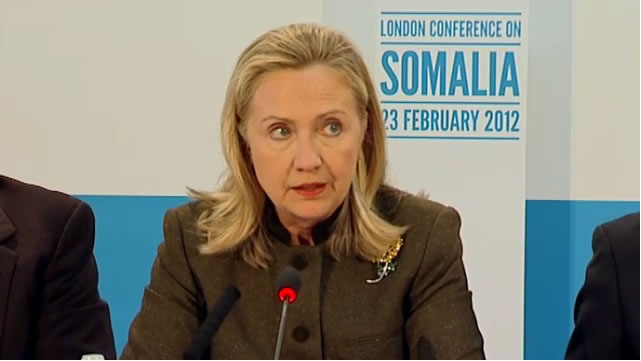
U.S. Secretary of State Hillary Clinton speaking at London Conference

By William Maclean and Arshad Mohammed
Thursday, February 23, 2012
LONDON (Reuters) - U.S. Secretary of State Hillary Clinton on Thursday threatened sanctions against anyone blocking reforms intended to end Somalia's "hopeless, bloody conflict" and eradicate militant and pirate groups seen as a growing menace to world security.
Addressing a conference aimed at energising attempts to end more than 20 years of anarchy, Clinton also demanded greater efforts to cut financial support for the al Qaeda-linked al Shabaab militant group fighting the country's weak Transitional Federal Government (TFG).
Al Shabaab is the most powerful of an array of militias spawned by 20 years of conflict in Somalia, where armed groups have a history of wrecking attempted political settlements and perpetuating war, instability and famine.
"The position of the United States is straightforward: Attempts to obstruct progress and maintain the broken status quo will not be tolerated," Clinton told the one-day gathering in London of about 40 African, Arab and Western leaders and government ministers.
"We will encourage the international community to impose further sanctions, including travel bans and asset freezes, on people inside and outside the TFG who seek to undermine Somalia's peace and security or to delay or even prevent the political transition."
Clinton and other speakers welcomed a Feb. 17 agreement among Somali leaders on plans for a parliament and constituent assembly to replace the TFG when its mandate expires in August.
FRACTIOUS
Establishing a legitimate successor government seen as inclusive by the country's fractious clans would be a vital step in restoring respect for formal politics among Somalis who tend to identify state power with corruption and brutality.
The TFG got a boost on the eve of the conference when the U.N. Security Council voted to increase by nearly half an African Union peacekeeping force in Somalia, seeking to press home a military offensive against al Shabaab.
The resolution expanding the AMISOM force to 17,731 from 12,000 troops and police passed the council unanimously.
In a further setback for the rebels, Ethiopian and Somali forces captured the al Shabaab stronghold of Baidoa in the south on Wednesday.
But some experts worry that the military campaign against al Shabaab may divert the energies of the TFG, a body widely seen as corrupt, badly managed and riddled with infighting.
"Time is of the essence," said Clinton. "The TFG will soon transition out of power. We need to build something in its place."
"Now, all those who have not yet joined this effort to unify Somalia - who are sitting on the sidelines or actively obstructing progress - have a choice to make. They can support this movement and join their fellow Somalis in moving past the divisions and struggles for power that have held their nation back. Or they can be left behind."
She said al Shabaab was weakening but pressure needed to be maintained. "Especially in south central Somalia, it has turned an already bad situation into a nightmare. It has dragged fathers and sons from their homes and forced them to fight in a hopeless, bloody conflict," she said.
British Prime Minister David Cameron told the gathering that a failure to end Somalia's chaos will endanger international security, and the time is right for the outside world to help the failed state get back on its feet.
Cameron said Somalis' problems "don't just affect Somalia. They affect us all. In a country where there is no hope, chaos, violence and terrorism thrive. Pirates are disrupting vital trade routes and kidnapping tourists."
RANSOMS
Cameron announced a number of aid and development initiatives including a proposal to set up an international taskforce on ransoms, the main tactic used by Somali pirates who seize ships and their crews in the Indian Ocean and Gulf of Aden.
"Let's set the ultimate ambition of stopping these payments because in the end they only ensure that crime pays," he said.
"Young minds are being poisoned by radicalism, breeding terrorism that is threatening the security of the whole world. If the rest of us just sit back and look on, we will pay a price for doing so," said Cameron.
The meeting's UK organisers have tried to temper expectations, explaining that the aim of the event is to galvanise policymakers' attention on Somalia to coordinate better a sometimes disjointed international response.
Nevertheless, Somalis who have known little but war, famine and blunder-prone international intervention for decades cannot help but hope for something that will improve their lives.
Somalia collapsed into feuding between rival warlords, clans and factions after president Mohamed Siad Barre was overthrown in 1991. Up to a million people have since been killed, according to the International Committee of the Red Cross (ICRC).
"The expectations that Somalis have are huge," Mogadishu-based civic activist Jabril Ibrahim Abdulle of Somalia's Center for Research and Dialogue think tank told Reuters.
"You have so many external actors driving different agendas that it would be a success to have a unified stance. Above all we need implementation of what's agreed, as disappointed hopes will only bring more radicalisation and hostility."
(Additional reporting by Adrian Croft, Peter Apps, Jonathan Saul, Richard Lough, Patrick Worsnip, Arshad Mohammed; editing by David Stamp and Giles Elgood)